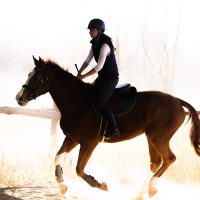Accidents On Horses: Who Is Liable?

Horses have always been a large part of farming, and a mode of transportation for many people. Today, horses aren’t just fun and recreation, they also are sport, as equine based activities, shows and competitions, are more and more common.
But horses can be unpredictable, as they are still wild, though trained, animals. When people are injured by horses, at equine-based activities, who is liable?
How People are Injured on Horses
A horse aggressively attacking is quite rare; more often, people are injured by the normal instinctive activities of a horse—things like bucking or running, which can easily throw a rider off the back of a horse.
There is a combination of factors that can make horseback riding so dangerous. Horses can be large animals; riders are often quite far off of the ground, meaning that when riders do fall off, they fall from high distances.
Making falls off the back of a horse even more serious is that in a typical saddle, the rider’s feet are strapped inside the holsters of the saddle. That means that when a rider is thrown off of a horse, the rider usually hits the ground head first. As beloved late Superman actor Christopher Reeve learned, paralysis can easily be the end result of a fall off of a horse.
Horses also don’t have shocks—the ride on the back of a horse is rarely smooth. Horses don’t care if they hit a ditch or an indentation on the ground, but you as the rider, do. That means that you can easily be thrown off of the back of the horse, just from the horse going over rougher terrain.
Who is Liable for Equine Injuries?
Generally, owners of horses aren’t liable for injuries caused by others who ride or who rent their horses, at least, not for any activities that are inherent and expected from riding a horse. That includes equine based sporting events, where the operators or organizers of the events, often can’t be sued for injuries that happen that are caused by the inherent nature or an expected risk, from riding a horse.
But there are times where someone injured on the back of a horse can sue the owner of the horse, or the organizer of an equine based activity.
Usually, if the operator or owner knew of a dangerous condition, or of the propensity of a given horse that would make that horse particularly dangerous (such as the horse being ill, or older, or having some other condition that may make it more rowdy or unsafe to ride), and failed to do anything about it, the victim can sue for damages.
Operators also may have an obligation to ensure that a horse is “matched” in size, with its rider—that is, not to put a rider who may be too small or too big, on a horse that is not matched for a rider of that size.
Contact our Rhode Island personal injury lawyers at Robert E. Craven & Associates at 401-453-2700 today if you are injured on a horse, or at an equine based activity.
Source:
equine.uslegal.com/equine-activity-law/rhode-island-equine-activity-law/#:~:text=Under%20Rhode%20Island%20Law%2C%20an%20equine%20professional%2C%20unless,risks%20of%20equine%20activities%2C%20pursuant%20to%20this%20chapter.
